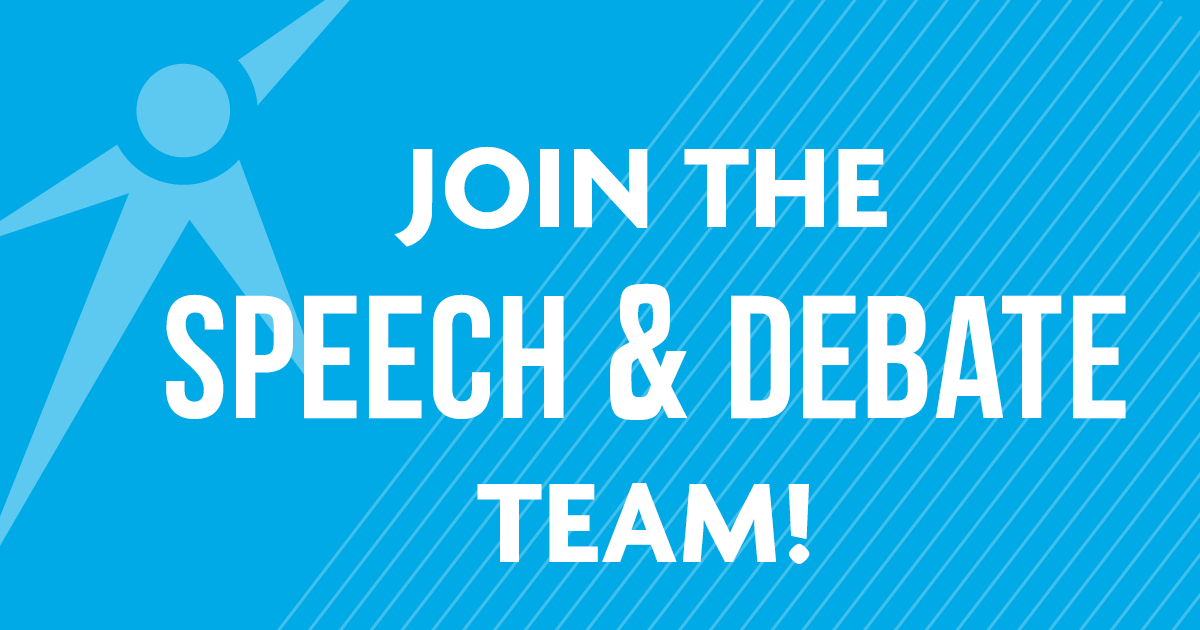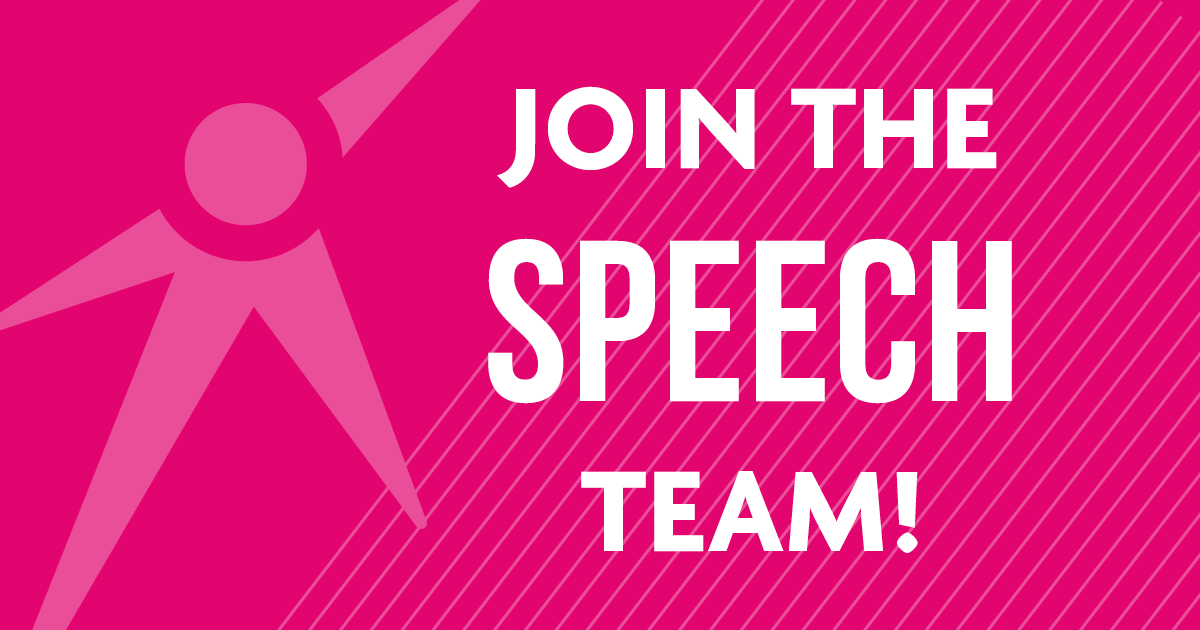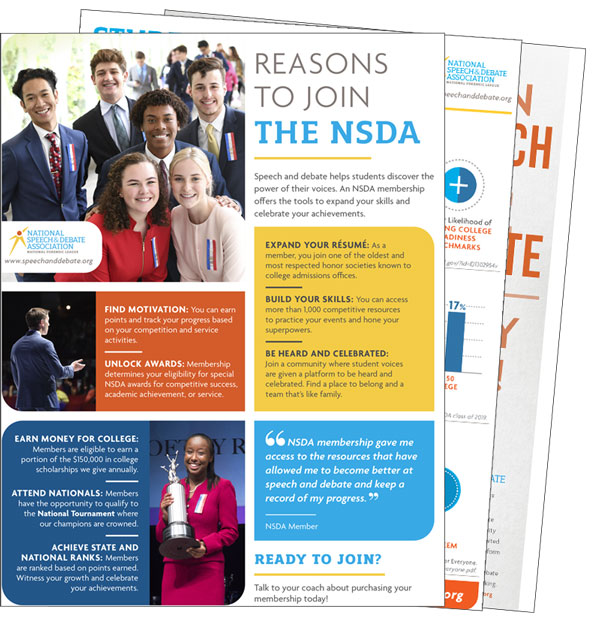Team Recruitment Strategies
BUILDING YOUR PROGRAM
As you consider how to bring in new students, use this guide as a jumping off point.
Starting the Season
Create a Team Website » If your school has a website, talk with the webmaster about creating a space for your team. The team site can include a membership roster, your mission, a note about speech and debate, a tournament calendar, team/school forms, news/press releases on the success of the team, and most importantly, your contact information. This website will also be a great asset to keep all faculty and administrators abreast of the happenings of your team.
Pick Your Talking Points » How will you sell students on the activity? What would be most persuasive based on your school culture and current team makeup? Here are a few ideas!

Speech and debate is a way to have your voice heard! Share your thoughts on the topics that matter to you.
It’s fun! Testimonials from current team members are a great way to demonstrate this.
Speech and debate is a way to connect with new people, hear new ideas, and shift your perspective.
The team is a family and gives all students a place to belong.
Build lifelong skills. Learn to research, think critically, listen, and communicate effectively.
Utilize Social Media » Check with your school for information on specific policies and procedures for using social media. If allowed, a team Twitter, Facebook, Instagram, or TikTok could be a great way to communicate, provide live results, and bring in new members. Use this set of graphics to pump up your posts.
Feature Recruitment Videos » Student to student advocacy is the best way to make the case for your program! Ask any current team members or recent alumni to share why they like the activity in short videos for your team’s social media pages. Then ask students to share the posts to expand your reach! Task students with creating these for you, or make use of one of our recruitment videos below. Share these on social media, add them to school announcements, or include them in your team meeting!
Explicitly Recruit BIPOC » Make your team an engaging and equitable space and let teachers know you are interested in recruiting students and assistant coaches who are BIPOC. It is the duty of schools, teachers, and coaches to improve the educational opportunities and achievement of all students, especially those students who have been historically and systematically excluded from educational opportunities afforded to White students. It is not enough to say anyone can join the team. It’s about actively recruiting and making space for BIPOC students. To learn recruitment and mentorship tips, enroll in our free NSDA Learn courses.
ing out only the students who show a natural affinity for performing, coaches can send a message of inclusion by making sure that information about joining the team is readily available for all students. Encourage teachers to mention speech and debate to their students as well—and don’t forget to go back to those teachers and tell them, “We owe a lot to you!” If teachers feel they were somehow responsible for the future success of a student who came into the program because of their encouragement, they will be yours for life.
Use Posters to Promote the Team » Hang posters around the school or in your classroom to spread the word, or print them out to include with informational packets about the team for parents or students.
- You can choose from even more materials with testimonial-style posters for Hispanic Heritage Month, Black History Month, Pride Month, Women’s History Month, Asian American and Pacific Islander Heritage Month, and the International Day of Persons with Disabilities.
- Create posters featuring members of your team with our free quote or yearbook style templates.
- Larger scale versions are available for purchase as a set through the NSDA Store.
- Each school will receive two full size posters with their NSDA school membership for the 2023-2024 school year.
Get into Classes » Work out your schedule so you or select students can pop in to every English classroom for a 3-minute recruitment speech about speech and debate. This speech is designed to make the students interested in either you or the concept of speech and debate. Use the talking points you outlined earlier! You might do this over the course of a Tuesday and Wednesday so you can have an informational meeting for new members on Thursday after school. It is important that this occurs during the first week. In the spring, you or your students can connect with feeder schools to pitch your program for participation in the fall.
Write a Letter » Since effective oral and written verbal skills are necessary components in speech and debate competition, one idea for recruitment is to send a letter to all of your English classes. Also, many established teams send out letters the year prior for the upcoming season. In general, teachers in the humanities are great allies for your program. Download a sample letter that could be formatted to use at your school.
Be Front and Center » Set up a booth at your school’s activities fair, get into school announcements and emails, or plan a public showcase of student performances so potential members can witness your team in action.
Recruitment Assistance from Teachers » During the first few “teacher only” days, and at the beginning or end of each semester, email all of the English teachers and ask them for a list of students they feel ought to consider speech and debate. Rather than limiting announcements to Honors and AP classes or singling out only the students who show a natural affinity for performing, coaches can send a message of inclusion by making sure that information about joining the team is readily available for all students. Encourage teachers to mention speech and debate to their students as well—and don’t forget to go back to those teachers and tell them, “We owe a lot to you!” If teachers feel they were somehow responsible for the future success of a student who came into the program because of their encouragement, they will be yours for life.
Recruitment from Students » Great students attract great students. Ask current students at the beginning and end of each school year to list at least three students whom they feel would make wonderful additions to your program. Make sure the students give you the correct spelling of the name, grade level, and area (speech or debate) in which they feel this person might excel. Encourage all current members to bring at least one new student to your first informational team meeting.
Plan Your Informational Meeting » Here’s a sample agenda for your meeting with students and parents!
- Kick things off with some introductions.
- Move into the explanation of how speech and debate works at your school. Consider having current team members represent different events and share why they like them, and break things up with sample clips from different events from our competition page.
- Go over the schedule for the year, how practices work, and expectations for team members. Cover how tournaments work and how students sign up. Mention the Honor Society, award and recognition opportunities, and the lifelong skills students learn in speech and debate. Use the talking points you outlined previously.
- Distribute information about the team that students and/or parents can take home. Use our promotional materials as a starting point and insert any specifics about your teams dues or policies.
- Invite students to their first practice or explain how they add the class, if your school offers one.
- End the meeting on an inspirational note with one of the videos above.
Talk to Students One-On-One » Get to know prospective and current students, their interests, and how speech and debate could help them reach their future goals. Be sure to emphasize the benefits of speech and debate beyond competitive success, like socialization, academic growth, service, and advocacy.
Pair up with Another School » If you’re still figuring things out, consider pairing up with another local school for your first meeting or practice, or even just a planning session for the year ahead. You could adopt some of their policies, discuss local tournaments, and share recruitment ideas.
Constant Recruiting
Once the school year begins, it is easy to resign yourself to the fact that you now have your team and this is the team you will have to live with the rest of the season. This is just not true. Some champion students join teams late. Keep your eye out for students who may have “slipped through the cracks” earlier. Check in with teachers and team members throughout the year for new student suggestions.
Share Tournament Results » After a tournament, publicize tournament results from your team. This is a great way to get your team’s success in the public eye. Find out what procedures exist to submit morning or end of the school day announcements. Submit announcements that highlight team and individual student success. Students love hearing their name, and they get a kick out of the positive attention they may gain from their peers and teachers. Often, at the beginning, a team doesn’t have many trophies to report. Don’t let this deter you from writing a compelling press release. You could write “Jayna Beal received a perfect score at the McLeod High School Invitational on Saturday for her performance in Dramatic Interp.” Then, when a student wins their first tournament, treat it like the Academy Awards. Create a press release and send your typed results everywhere you can, every time you compete.
-
- The public relations/communications director for your school/district.
- The faculty and staff at your school, including your website staff.
- Your school board members, superintendent, and/or head of school.
- The person who makes the daily announcements at your school.
- Your local paper.
Do you have recruitment ideas we should consider? We’d love to hear them! Email Director of Membership Annie Reisener at annie.reisener@speechanddebate.org.





